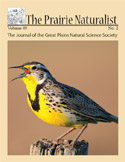Great Plains Natural Science Society

The Prairie Naturalist
Date of this Version
12-2017
Document Type
Article
Citation
The Prairie Naturalist 49:79; 2017
Abstract
Nesting behavior by Trumpeter swans (Cygnus buccinator) has been well documented for most populations. Both sexes cooperate in nest construction, which takes 11–35 days to complete (Hansen et al. 1971, Cooper 1979). Nests generally range from 1.5–3.6 meters in diameter and 1.5 meters in height and are typically built on solid structures such as a muskrat (Ondatra zibethicus) house or an island (Hansen et al. 1971, Cooper 1979). However, we discovered an atypical Trumpeter swan nest built of cattail (Typha angustifolia L.) located on Vaughn Lake, in Cherry County, Nebraska on 13 May 2016.
We monitored the atypical nest by placing a Nikon D7000 camera, with a 35mm wide-angle lens, approximately 5 meters away on 18 May 2016 at 1800 hours (day 0 of camera placement). The camera was scheduled to take a photo every 5 minutes during daylight hours. We marked all eggs (n = 5) and aged three of the five eggs by floating (Rohwer and Eisenhauer 1989) and concluded they had been incubated for approximately 25 to 30 days. Therefore, the eggs were due to hatch in 2–11 days because Trumpeter swans typically incubate for 32–37 days (Banko 1960). We noticed the neststructure was unstable, free floating, and shorter than most Trumpeter swan nest structures that we have encountered throughout the Sandhills region of Nebraska.
Included in
Biodiversity Commons, Botany Commons, Ecology and Evolutionary Biology Commons, Natural Resources and Conservation Commons, Systems Biology Commons, Weed Science Commons


Comments
Published by the Great Plains Natural Science Society. Used by permission.